| History - 49th A.I.B. - Service Co. |
 | Index
|
| Index
| | Next |
| Next |
|
(Pages 49-52)
'W E' l l N E V E R G O O V E R S E A S'
|
|
Rumor-filled Camp Polk, Louisiana was 'de-rumorized' the night of October 27th, 1944. At 2200 we were on our way to a POE, and at 1810, Monday, the 30th of October, 1944, we arrived at Camp Kilmer, New Jersey.

Camp Kilmer, New Jersey, is a paradise for soldiers, except for the fact that when you get there you know you're not staying in the United States very long, unless you are fortunate enough to be a member of the permanent party.
The camp is large and its facilities are many. The post exchanges, numerous throughout the camp, would be enough entertainment and enjoyment if there was nothing else in the camp. After struggling through 18 months of Camp Polk PX's the Kilmer PX's were department stores and restaurants thrown into one. With the ever present juke box went containers of milk, cake, cookies sandwiches, hotdogs, ,eggs, hamburgers, double-chocolate malteds, ice cream, (all you could eat), chewing gum, cigarettes, (by the carton), jewelry, etc., and pretty girls to serve it to you. Everything was swell, it couldn't be beat.
The movie houses showed the latest features, plus USO shows. They had several non-com clubs, dances every night with lots of gals from nearby towns. The mess hall served good chow, and it was on time.
Practicing getting on and off the train was a waste of time since we did it differently when the real McCoy came along. We had drill climbing rope ladders simulating "abandon ship" (But our boat wasn't even
|
attacked by a sardine). We hiked back and forth getting sore feet and no place in general. They checked our clothing in a showdown inspection that was a laugh. We lined everything up according to grid co-ordinates, and then some, Private went through taking a quick look, and inquiring, 'has everyone got everything?' (that could have been with less glamour!) The camp was overflowing with WAC'S (that's bad?) The Personnel Section reports that the way the WAC'S checked service records was a joke, but the entertainment wasn't bad. Passes were issued for two nights to go New York City, and were frozen on Saturday November 4th 1944. Lugging everything on our backs we started for the boat at 2330, Monday 6th November 1944.
Our short stay at Camp Kilmer was appreciated by all of us. We wished we could have stayed longer. It was a heavenly place and we couldn't go wrong there. We'd go back if we had to . . . . . for a discharge only.
The train from Camp Kilmer took us to the Jersey coast where we boarded a ferry that shuttled us across to our boat. On the pier "sending" us away was a colored band from the Second Service Command, and Red Cross women served us hot coffee and doughnuts. And then came the 'last mile' as we boarded His Majesty's Ship - an English Transport that went under the name of 'SAMARIA'. Being jammed into a room with double bunks, equipment, 32 of us in bunks and 16 sprawled on the floor, the room wasn't crowded at all. When the first man took a breath it knocked the last man down. The room wasn't stuffy, we donned gas masks for drill purposes! The boat did not pull out that night, and we went to sleep. (It says here in print.)
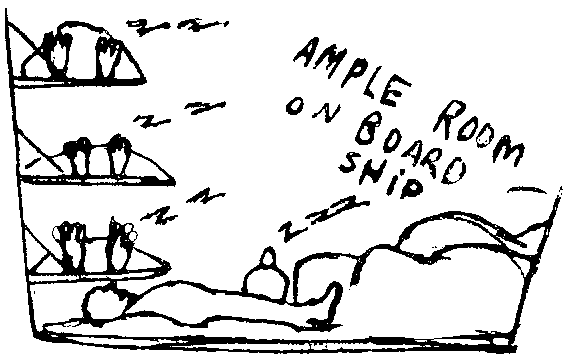
|
-- 49 --
|
The following day, Election Day, we sailed at 10:00. We were up on deck watching the New York skyline fade from view. This was it, and it was hard to believe that we were pulling away from home, not knowing when we would be back . . . . if ever.
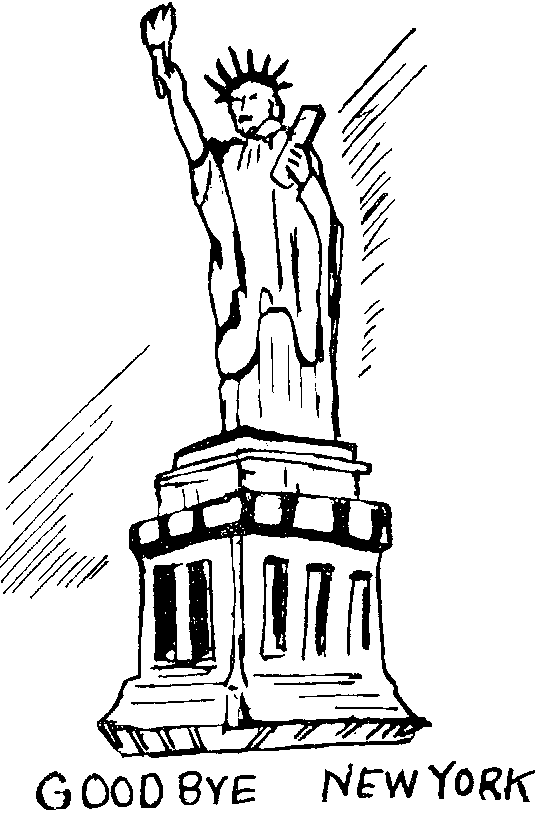
So Roosevelt was re-elected, and on November 8th, 1944, we had our first boat drill which resulted in a lot of fellows getting seasick and leaning over the rail. Two meals a day were served on board ship - one at 8:00 in the morning and the other at 6:00 in the evening. Both were delicious! Even the cellophane on the hot dogs tasted great! (Pass the "K" rations, buddy.) If you ever want to get an appetite to eat, stand on "0" deck and watch your chow go by. (And then the Ship's store was mobbed, and the chocolate bar became King for 14 days!)

Until the 19th of November, ]944, we went through something like this: Drills on deck, go below, stay on deck, inspections, latrine details, go below, stay on deck exercises, (and the boat was at an angle of 90°) go below, stay on deck, and on the 19th of November we stayed on deck as we pulled into Southampton, England. An English band was there playing for us. You
|
could see that Southampton had been blitzed. We had to stay on the ship that night, as all vehicles and equipment had to be unloaded first.
The trip across was an uneventful one. When we weren't hanging over the rails, we were either reading, shooting the old dice, or following some schedule someone thought up. 'Ski' (Tec. 4 Casimir Skoronski of ration fame) puts his claim in as the only man who stayed in bed all the way across, although Don Randall of Personnel says that he and the bed were pretty close friends throughout the trip. I wouldn't say we lost weight on the trip, but when we disembarked we looked like remnants of a Jap garrison on Iwo Jima. 'Pappy' Cole (S/Sgt. Robert Cole) distinguished himself from others by arriving in the same condition that he started. (Some claim he put on weight.) T/Sgt. Jarvis Hutto's cry 'Have you got any eatin' material?' will long be remembered.
On Sunday, 20th November, 1944, at 1730 we disembarked from the Samaria and boarded an English train. With blackout curtains down we rode along for about an hour and a half and arrived at Tidworth, England, where our advance party was waiting for us with trucks. We arrived at our area at 2080 finding that we were living in tents at a place called Pennings Camp. It was late at night, cold, and we made the best of it for the night.
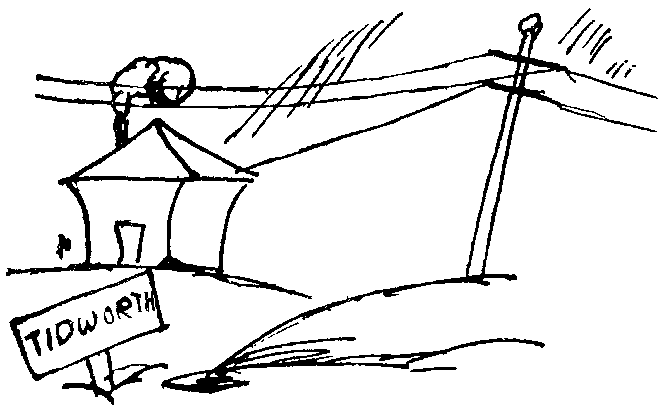
The dawn awoke on the 2]st of November and we awoke with it. We started arranging things to suit ourselves, and also getting G.I. about it. For the first few days we all ate at one mess hall, and then we finally got our own. S/Sgt. Ambrocio Gamboa's crew has us spoiled. It's the only chow in the Army that no one can make a gag about.
|
-- 50 --
|
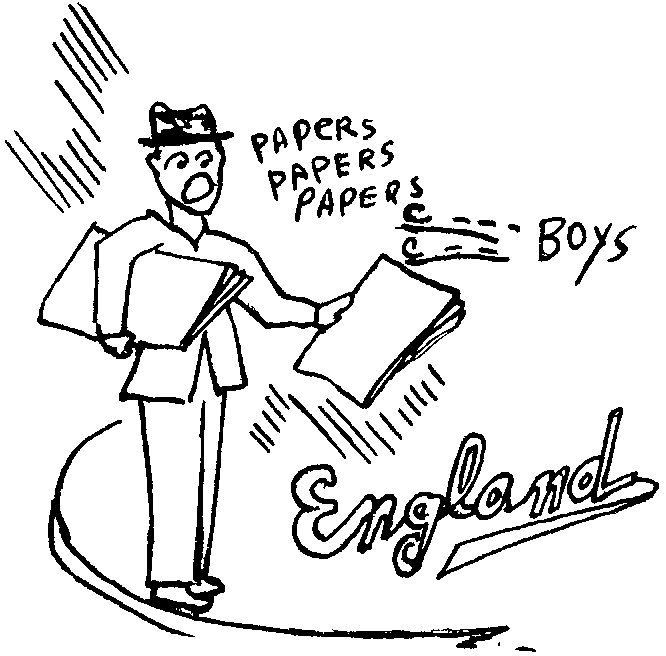
Throughout our stay at Tidworth we were preparing to move out to France. Vehicles and equipment were 'shaped up', and organizational duties continued on a schedule basis. It rained, it was muddy, it was cold. Passes were issued to visit London, and other cities in Great Britain. Convoys left at night to visit nearby towns, and for those who didn't care to ride there was always a movie at our Recreation Hall, with a jam session by the 49th Band before the show. On Christmas Day the kitchen crew prepared a super dinner, and we served the nearby Orphan Children. Time was going by and it looked like the real thing was due soon.
On Sunday, 30th December, 1944, there were no more passes, no more nuthin'. We were alerted to move out the following Tuesday morning. Clothing, guns, vehicles, and all equipment, were rechecked. New Years Eve was more of a checking night than a celebration night.
On January 1st, 1945, we had more check-ups and were issued 'K' rations and 'D' rations, ammunition, etc. We were ready to move out the next morning.
January 2nd, 1945, Tuesday, we were up at 5:30 A.M., ate 'C' rations for breakfast, and started cleaning up around the area. Tents and the area were put into perfect shape, and we were ready to move out at 900. We finally pulled out of Pennings Camp at 1005 in one of the longest convoys we had ever been in. We rode through England towards our marshalling area which was Hurley's Camp near Southampton. We arrived at Hurley's Camp at 1630. We hung around in the mud for awhile, and then we were served hot 'C' rations for supper. Quarters were found for all of us to sleep in for the night.
The personnel Section stayed up most of the night getting Embarkation rosters ready for the next day. At 0600 on the 3rd January, 1945, we had a quick breakfast, loaded up and pulled out for Southampton Docks. We arrived there at 1200.
|
We had "K" rations for lunch, and they started loading up the vehicles on board ship. The name of the ship that was to take us across the Channel was the Liberty Ship 'JOSEPH STOREY'. We finally boarded the ship at 2100, and were herded into one of the holds in the ship. There were 250 of us on this ship including all vehicles and equipment. The bunks were stacked 4 high, and weren't very comfortable. We weren't pulling out till morning, so we all hit the hay for the night.
We were up at 0700 and the ship pulled out of dock and anchored about a mile out. We weren't going to make the run across the channel until 1900. We hung around deck, shaved from our steel helmets, ate 'C' rations for all three meals, and talked with the sailors aboard ship. At 1900 we were told to keep our lifebelts handy, and that the hold we were in was dangerous if we should be hit by a torpedo. Those who wanted to sleep on deck could do so. Some fellows did. The ship slipped out into the dusk about 1915 and we were off for the race across the channel. The waves were becoming choppier and the boat tossed relentlessly. We climbed into our bunks. Most of us were fully clothed.
At 0800, 5th January, 1945, we were up on deck. We were still heading, across the channel. During the afternoon we sighted land and everyone crowded the rails. We anchored outside Le Havre, France, towards evening, and the ruins of the city could be seen. We stayed at anchor that night and slept on the boat again.
We hung around the deck the following day waiting to be tugged into port. At about 1600 we started moving slowly forward, and a tug pulled us into the harbor. We passed many sunken boats, and it was really a tight squeeze into port. We finally docked alongside another transport at 1700. An. hour later we moved over to an empty pier. AFS men arrived and started unloading our equipment, and we spent another night, on the boat, while the unloading continued throughout the night.
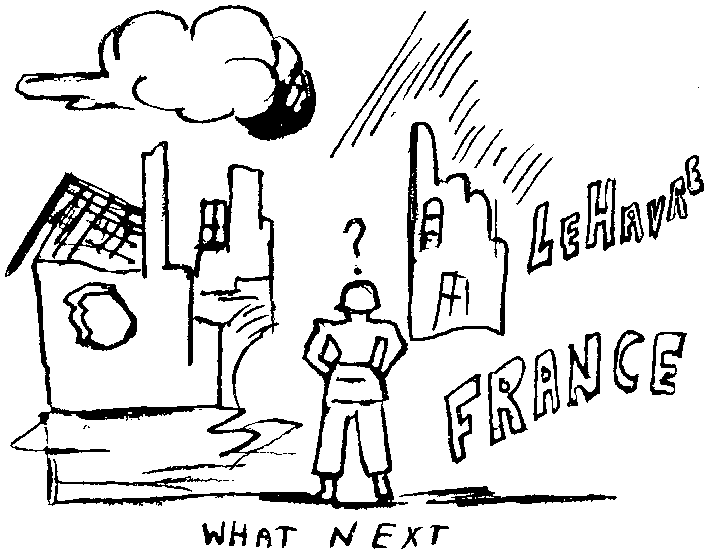
|
-- 51 --
|
At 0800, January 7th, 1945, we touched French soil. It was raining as we disembarked from the ship. Service Company had chow ready for all aboard ship, and we ate in the rain. The rain let up a little and we did a bit of exploring, finding that Le Havre was really bombed out. At 1300 we mounted up and started for our new destination. We rode for four hours through towns and villages, people waving at us now and then, and kids along the way requesting 'cigarette for papa?' At 1700 we arrived at Totes, France, a small village, and set up house in a small chateau. The weather had turned icy, and those who didn't pull guard that night were lucky.

The following day was spent in shaping up a bit from the trip we had just taken. Some of us made a reconnaissance of the country side picking up cider and souvenirs for cigarettes. After 6 days of 'C' rations we had a chicken dinner, and it really tasted like caviar. We were to move out the following morning, and a few new, warm, articles of clothing were issued to us by S/Sgt. Neil McKenzie.
We were up at 0500 on the 9th January, 1945, had breakfast and pulled out of Totes at 0600. It was very cold out, and we rode on for hours, finally pulling into a wooded area at 1930. It was pitch black out and we were to stay in the woods. A strict blackout
|
was enforced. The mess truck had hot coffee ready for us, and bedrolls were issued. Pup tents were erected, and we all climbed into our sacks for the night. The weather was real mean.
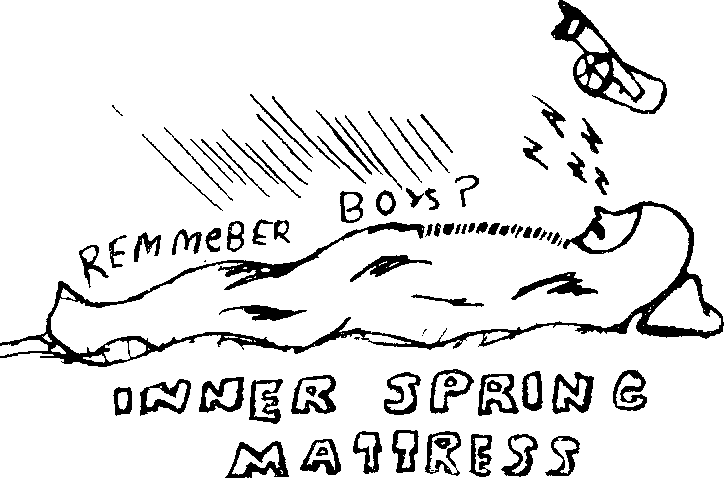
At 0700 the next day we were up and had a very hot breakfast. Our company was moved out of the area into another area where we pitched pup tents, and Personnel set up their C.P. Tent. We got hay for the bottom of our tents and made things as comfortable as possible. We were waiting around now for orders, and that night a lone jerry plane came over and dropped a few eggs on the nearby town of Soissons. He was fondly known as 'Bed check Charlie'.
It was freezing on the morning of 11th January, 1945. Everyone was up early moving around to keep warm. It was just a usual day of keeping things ready for a quick move out. And this came quite suddenly after everyone had gone to sleep. At 2330 the call came through to move out within an hour. Everyone sprang into action and the whole Battalion was ready to go. The convoy started out at 0300, leaving the Personnel Section under Mr. Theis, and the Ammo Section under Mr. Whipple behind. From this point on the Service Company Sections, being split, will take up their own adventures and stories. . . . . That Camp Polk rumor still lingers in our minds - - 'We'll never go overseas!'.

|
-- 52 --
|